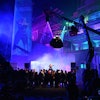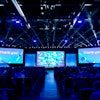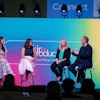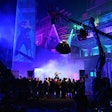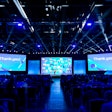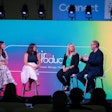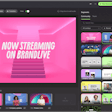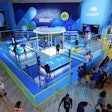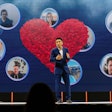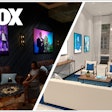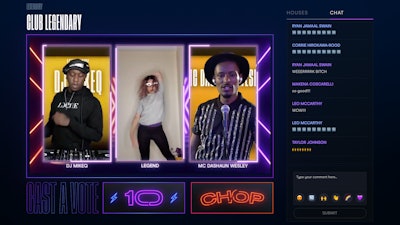
LOS ANGELES—Hollywood has long been creating over-the-top premiere parties to debut its newest properties. So when the COVID-19 pandemic caused live events to come screeching to a halt, many entertainment companies and studios—including HBO Max, TNT, and National Geographic—wanted to think beyond the simple live stream. The end result? Fully immersive, virtual screenings and after-parties to celebrate new series.
“When we look at doing an event, we really have three key goals," explained Chris Albert, National Geographic's executive vice president of Communications Worldwide and Talent Relations, who calls it the "three C rule." "Community—bringing together the entertainment community to honor great work in a meaningful and unique way. Celebration—a way to celebrate the incredible talent we are so fortunate to work with, both in front of and behind the camera. And champion—a way to champion projects we believe in and provide them a platform for increased press and industry attention."
He added, "When we pivoted to virtual events, we still looked at them through the same lens and with the same goals."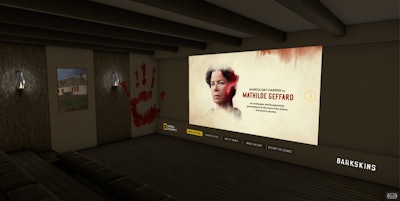 For the Barkskins premiere on May 17, National Geographic worked with 360 Design to create a virtual theater space that evoked the show's world.Photo: Courtesy of National Geographic
For the Barkskins premiere on May 17, National Geographic worked with 360 Design to create a virtual theater space that evoked the show's world.Photo: Courtesy of National Geographic
For example, to premiere its new series Barkskins—based on the novel by Pulitzer Prize-winner Annie Proulx—National Geographic teamed up with Beck Media & Marketing to develop a premiere screening and post-screening Q&A. To make the virtual event feel immersive, the team tapped digital firm 360 Design to build a virtual theater space that evoked the series' visuals—complete with period-appropriate benches, log cabin-inspired beams and flooring, and flickering lanterns on the walls. “We also wanted to provide an experience to our guests who logged in early, so we had activities for viewers—whether looking through behind-the-scenes photos, getting introduced to the characters, or looking at a behind-the-scenes piece on the show,” said Albert. “We wanted our audience to feel immersed in the experience from the moment they logged in."
The Barkskins screenings—one on each coast—took place on May 17 and drew a combined 3,300 attendees. Days earlier, on May 13, the studio also hosted a virtual press junket; Beck Media worked with video production company PremiereTV to create four simultaneous Zoom rooms, where a dozen cast and crew members gave interviews to journalists around the world. The five-hour junket took a team of 20 staffers to produce.
Related: Top 10 Innovative Brands 2019: National Geographic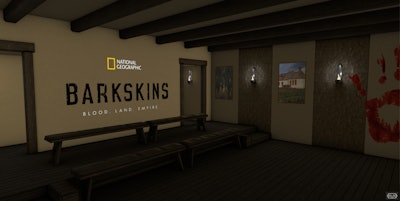 The digital room had period-appropriate benches, log cabin-inspired beams and flooring, and flickering lanterns on the walls.Photo: Courtesy of National Geographic
The digital room had period-appropriate benches, log cabin-inspired beams and flooring, and flickering lanterns on the walls.Photo: Courtesy of National Geographic
Entertainment conglomerate WarnerMedia, meanwhile, has been using virtual premiere parties to build buzz for HBO Max, the company's new streaming service that launched on May 27. Working with creative studio Little Cinema, the team hosted premiere screenings and interactive after-parties for buzzy new shows Legendary and Love Life on May 26 and May 21, respectively.
"We were six weeks out from launching HBO Max, and had numerous events planned to showcase HBO Max’s rich library of content,” said Eileen Quast, vice president of events for WarnerMedia Entertainment. “Rather than taking our existing plans and transforming them directly to virtual events, we spent a few weeks examining what special events looked like in the ‘new normal.’”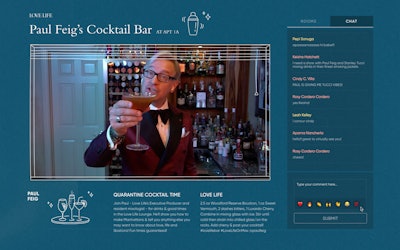 After HBO Max's Love Life screening, attendees entered the virtual after-party, which had a series of interactive rooms; in one space, series producer Paul Feig mixed cocktails and interacted with the crowd.Photo: Little Cinema
After HBO Max's Love Life screening, attendees entered the virtual after-party, which had a series of interactive rooms; in one space, series producer Paul Feig mixed cocktails and interacted with the crowd.Photo: Little Cinema
WarnerMedia ended up forming a virtual event task force, which brought together representatives from several different departments, and Quast reached out to Little Cinema founder Jay Rinsky, who she had worked with in the past on immersive premiere parties for TNT’s The Alienist and I Am the Night. Rinsky hired a technical team to build the virtual event platform from the ground up to ensure an elevated—and secure—screening and after-party. “[Rinsky] drew from his experience producing immersive theater,” noted Quast. “During a time when we’re isolated at home, we wanted to create an after-party that brought our community back together and promoted social interaction in the same immersive fashion we had taken for our 'in real life' events."
For example: Following the browser-based screening of the first episode of Legendary, HBO Max's new underground ballroom dance competition series, guests entered a virtual space featuring a series of breakout rooms dubbed “houses” (the term used for different dance groups in the ballroom world). In the main area, series host Dashaun Wesley led a live voguing competition; event attendees could turn on their cameras and show off their moves, while fellow attendees voted on their skills and interacted through a chat function. Other rooms aired pre-recorded videos on each group in the competition, and another included a fun video of Wesley explaining common terms in the underground ballroom scene.
Related: Top 10 Innovative Brands 2019: HBO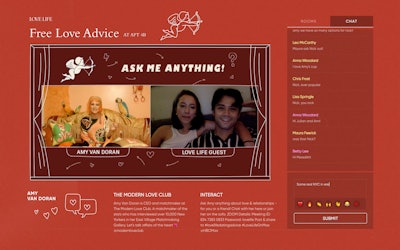 In another area of the Love Life premiere, matchmaker Amy Van Doran gave love advice to real couples, who were streamed in through Zoom.Photo: Little Cinema
In another area of the Love Life premiere, matchmaker Amy Van Doran gave love advice to real couples, who were streamed in through Zoom.Photo: Little Cinema
The virtual after-party for Love Life, which took place after guests streamed the first two episodes, also used a variety of different rooms—this time evoking an apartment building in New York City, where the Anna Kendrick-fronted romantic comedy series takes place. The four different spaces included a bar setting where series producer Paul Feig mixed cocktails and interacted with the crowd through the chat. In another room, matchmaker Amy Van Doran gave love advice to real couples, who were streamed in using Zoom. Two more areas included live streamed karaoke, plus a DJ set from Michelle Pesce.
And earlier in the month, WarnerMedia also tapped Little Cinema for the premiere of TNT’s Snowpiercer, a new dystopian drama series starring Jennifer Connelly and Daveed Diggs. The series, based on the 2013 film and 1982 graphic novel, is set on a perpetually moving train—so the virtual after-party appropriately featured six “cars," each with a different live performer. In one space, actress and singer Lena Hall performed as her character from the show; other cars featured magic tricks, fortune-telling, cocktail-making lessons, a DJ set, and more.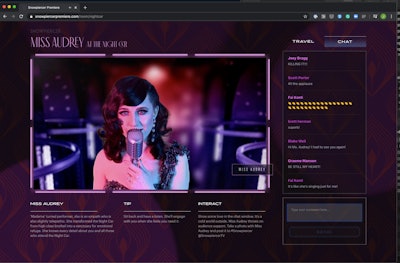 WarnerMedia also worked with Little Cinema on the premiere party for TNT's Snowpiercer, held on May 14. Evoking the series' train, the virtual event had a series of "cars," each with a different live performer. In one space, series star Lena Hall (pictured) performed in character.Photo: Little Cinema
WarnerMedia also worked with Little Cinema on the premiere party for TNT's Snowpiercer, held on May 14. Evoking the series' train, the virtual event had a series of "cars," each with a different live performer. In one space, series star Lena Hall (pictured) performed in character.Photo: Little Cinema
To further immerse guests in its premieres, WarnerMedia delivered physical care packages to VIP attendees. For Love Life, messengers hand-delivered everything needed for the perfect at-home date night: a three-course meal from local businesses (Mary Giuliani Catering for New York-based attendees, and Pizzeria Mozza for those in Los Angeles), plus a bottle of wine and a make-your-own Manhattan cocktail kit. The delivery also included branded wine glasses, candles, an on-theme game, and even a hand-held microphone to use during the after-party's live-streamed karaoke. “We thought it was important to have tangible items to bring to the premiere to enhance the live experience,” said Quast.
The Legendary and Snowpiercer events also included deliveries; for Legendary, guests received a "slay box," which featured a branded fan, a judging card, glittery nail polish and makeup, a coffee table book about the history of the ballroom scene, and more. For Snowpiercer, guests were sent the original graphic novel, a branded flask, a box of chocolates, and other on-theme goodies. HBO Max also added a charitable component to its premieres. For Legendary, the company made donations to the Trevor Project and GLSEN; for Love Life, a donation was made to NYC Health and Hospitals' COVID-19 relief efforts. 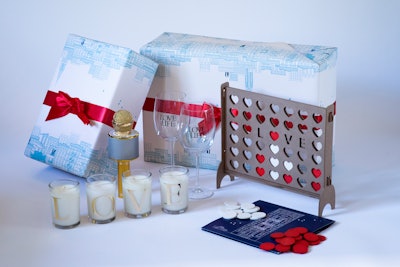 Love Life attendees also got a delivery that included a meal from restaurants in either New York or Los Angeles, a bottle of wine, and a make-your-own Manhattan cocktail kit—plus branded wine glasses, candles, a themed game, and even a hand-held microphone to use during the after-party's live-streamed karaoke.Photo: Yannick Delva
Love Life attendees also got a delivery that included a meal from restaurants in either New York or Los Angeles, a bottle of wine, and a make-your-own Manhattan cocktail kit—plus branded wine glasses, candles, a themed game, and even a hand-held microphone to use during the after-party's live-streamed karaoke.Photo: Yannick Delva
Ultimately, said Quast, “Our guest list has quadrupled [due to the digital environment,] and we have Hollywood elite and press in attendance that typically wouldn’t be in town or available. Behind the scenes, we have talent from across the globe working on our events, including tech specialists in London and an audiovisual artist in Australia."
She added, “We have always wanted to find a way to extend our premiere events beyond the four walls of the room. I hope we’ll take these learnings with us when we get past COVID-19.”
Albert echoes that point, noting that National Geographic's virtual premieres have drawn twice as many guests as expected, including celebrities and influencers from all over the world. “I don’t think virtual will ever replace the true sense of community that you get from an in-person event, and we look forward to doing those again soon," he said. "But I do think that even when we go back to in-person events, we can find ways to incorporate the virtual elements, too, in order to broaden our reach and audience.”
